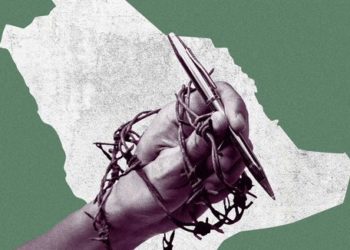
Reporters Without Borders International ranked the Kingdom of Saudi Arabia 170th out of 180 countries in the world rankings for press freedom in a new evidence of the Saudi regime’s violations of human rights.
The international organization said that the free media is absent in the Kingdom, where journalists are subjected to strict surveillance, even if they are abroad.
The organization stated that this was confirmed with the assassination of prominent journalist Jamal Khashoggi in Istanbul, Turkey, in early October 2018.
She noted that although Crown Prince Muhammad bin Salman had adopted an opening letter when he assumed power in June 2017, the wave of repression had worsened significantly.
Since that date, the number of citizen journalists and journalists behind bars has tripled, and the detention of most of them has been arbitrary, while all prisoners of conscience have been systematically tortured.
The Penal Code, as well as anti-terrorism and cybercrime laws, require that journalists be imprisoned or suspended from work whenever they are criticized or express their opinion on political matters (where they are accused of blasphemy, violating religion, threatening national unity, or harming the image of the king and the state).
Despite all this, self-censorship is the rule even on social networks, as anyone who criticizes the Kingdom’s role in the war on Yemen, calls for rapprochement with Qatar, or opposes the normalization of relations with Israel is accused of treason.
Journalists who choose neutrality are subject to various types of accusations if they do not follow the same line as the official media in praise of bin Salman. On the Internet, they face various forms of persecution and harassment by the “electronic flies” army, which is a heavily active brigade on social media platforms, especially Twitter.
According to Reporters Without Borders, the Kingdom is also resorting to very advanced spying techniques to track the movements of journalists living in exile or to monitor some influential figures, as exposed by the issue of the Washington Post owner’s cell phone hack, Jeff Bezos.
A few weeks ago, an international committee placed the Kingdom at the top of the list of countries violating the rights of journalists due to the repressive policies of the Saudi regime.
The Committee to Protect Journalists issued its annual list of imprisoned journalists, in which the kingdom ranked third.
The committee said that China and Turkey top the countries that imprison the largest number of journalists, followed by the Kingdom and Egypt, then Eritrea, Vietnam and Iran.
The committee highlighted that “the presence of authoritarian regimes, turmoil and protests in the MENA region has led to an increase in the number of imprisoned journalists in the region, especially in Saudi Arabia, where the number of detained journalists has jumped to 26 journalists in 2019, and with Egypt ranks third among the countries that imprison most journalists.”
The Committee to Protect Journalists reported that the number of journalists imprisoned for their work in the world reached at least 250 for the fourth year in a row, and China and Turkey topped the list of countries imprisoning the largest number of them.
Joel Simon, executive director of the Committee to Protect Journalists, said, “one journalist’s prison is a gross injustice and has wide ramifications for families, friends and colleagues. The imprisonment of hundreds of journalists, year after year, is a threat to the global information system that we all depend on. Repressive governments use these harsh methods to deny basic information to their societies and the entire world.”
It is worth noting that the commission’s report does not include the journalists who were detained and released throughout the year.